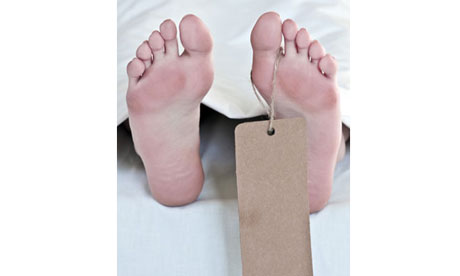
The thing about my week is that it is completely different from any other doctor's. You won't find me treating a single patient – I don't do any healthcare at all. I just do autopsies.
On Monday, I went to a local district general hospital and supervised some of my trainees' autopsies. These were unexpected deaths from the community where the doctors didn't know why their patient had died. They are definitely not suspicious, so we use them as a teaching aid for trainee hospital pathologists. That day there was one case of straightforward heart disease. Another had a bloodclot on the lung.
I'm based in Newcastle, but on Tuesday I drove to Wakefield to do what is called a defence autopsy. Somebody had died in suspicious circumstances, a postmortem had been performed by a Home Office pathologist, and somebody else had been charged with a related offence. As the person who had been charged has a right to a re-examination of the body as part of their case, I'd been asked by a firm of solicitors if I could go and examine that body. Often, we'll just confirm the original findings – there's not a lot to argue about.
I started off Wednesday by doing some independent autopsies. This is for people who have died in hospitals, whose deaths are not suspicious but where there are concerns that the hospital's treatment was not up to scratch.
I had three of these, and in one of them, unfortunately, I had to tell the doctor involved that the diagnosis they had made was incorrect. It is not the easiest position to be in. The doctor was absolutely heartbroken.
Thursday was quite unusual. I flew to Bristol to be interviewed for a television programme. It was a historical documentary about Sir Bernard Spilsbury, the first Home Office pathologist, and it's all about whether the evidence he gave would stand up in a modern courtroom. Actually, it would stand up quite poorly. If I gave the evidence he gave, the defence barrister would rip me apart, and I'd go home crying.
I spent quite a bit of Thursday afternoon talking to lawyers about a trial coming up next week. I'm working for the defence – I've got serious concerns about the case being presented against the defendant. I just don't think he has committed the crime in the way that the prosecution is suggesting.
On Friday, I did some "critical conclusion checks" on colleagues' work, to make sure I'm happy with the examinations they have done. Every statement you make in an autopsy has to be checked by another Home Office pathologist. And at 9am, I also started my week on-call, which means that until 9am next Friday, I am available for the police to ring me up and say, "We have got a suspicious death – can you come and look at the body and give us your opinion?" We average four to five of those week, of which only two will turn out to be murder.
I spent the evening doing an autopsy on a man killed on the road. Afterwards, I was brought a bone that had been found in the North Sea. I think it was human. I advised the police to take it to a physical anthropologist.
In some ways, this job makes you much more fatalistic. You see a lot of people who have lived "right" and still died at 50, and then you see a lot of other people who have had dreadful lifestyles and died at 90. And when you see people who have died after just being randomly assaulted, it does make you a little more nervous.
Then again, we only ever see the worst outcome. A hundred people might have an operation, and 99 of them go home well. But I see the one-in-a-hundred where it goes horribly wrong.

